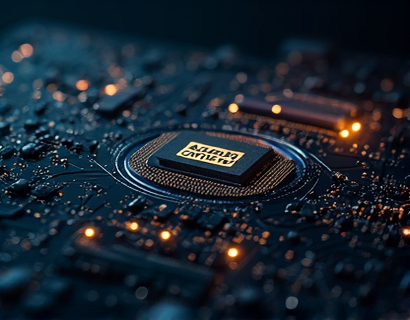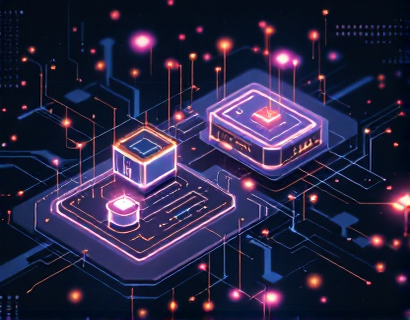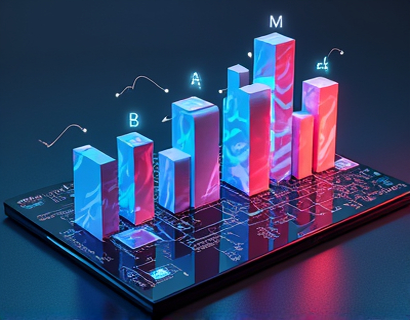Blockchain Oracle Management: Streamlining Data Integration and Enhancing Smart Contracts for Decentralized Applications
In the rapidly evolving landscape of blockchain technology, the integration of reliable data sources is crucial for the success of decentralized applications (dApps). Blockchain oracle management plays a pivotal role in this process by ensuring that smart contracts have access to accurate and timely external data. This article delves into the intricacies of blockchain oracle management, focusing on how it streamlines data integration and enhances smart contract functionality, ultimately unlocking the full potential of blockchain applications.
Understanding Blockchain Oracles
Blockchain oracles serve as bridges between the blockchain and the external world, providing smart contracts with real-world data and allowing them to interact with off-chain services. These oracles are essential for dApps that require up-to-date information from sources such as IoT devices, financial markets, and sensor data. Without reliable oracles, smart contracts would be limited to operating based on pre-programmed logic alone, lacking the dynamic capabilities needed for real-world applications.
The Importance of Oracle Management
Effective oracle management is vital for the seamless operation of dApps. It involves the selection, integration, and monitoring of oracles to ensure that the data fed into smart contracts is accurate, secure, and timely. Poor oracle management can lead to data inconsistencies, security vulnerabilities, and operational inefficiencies, all of which can undermine the trust and functionality of blockchain-based systems.
Challenges in Oracle Integration
Integrating oracles into blockchain applications comes with several challenges. One of the primary concerns is data reliability. Oracles must provide accurate and consistent data, which can be difficult given the diverse and often unpredictable nature of external data sources. Another challenge is security. Oracles can become points of vulnerability if not properly secured, potentially exposing the blockchain to attacks. Additionally, the decentralization of oracles is crucial to prevent single points of failure and ensure robustness.
Streamlining Data Integration
Streamlining data integration is a key aspect of efficient oracle management. This involves creating a seamless flow of data from external sources to smart contracts, ensuring that the data is processed and utilized in real-time. Advanced oracle management solutions employ various techniques to achieve this, such as data aggregation, filtering, and validation. These processes help in reducing latency, minimizing errors, and enhancing the overall reliability of the data fed into smart contracts.
Data aggregation involves collecting data from multiple sources and combining it into a single, coherent dataset. This is particularly useful for dApps that require comprehensive information from various external systems. Filtering and validation ensure that only relevant and accurate data is used by smart contracts, reducing the risk of errors and enhancing the integrity of the system. By implementing these techniques, developers can create more robust and efficient blockchain applications.
Enhancing Smart Contract Functionality
Enhancing smart contract functionality through advanced oracle management is crucial for the development of sophisticated dApps. Smart contracts are only as powerful as the data they can access and the actions they can perform based on that data. By integrating reliable and diverse data sources, smart contracts can execute more complex and dynamic operations, such as automated trading, supply chain management, and decentralized finance (DeFi) protocols.
For instance, in the context of DeFi, oracles play a critical role in providing price feeds, which are essential for decentralized exchanges (DEXs) and lending platforms. Accurate and timely price data ensures fair and efficient market operations, enabling users to make informed decisions. Similarly, in supply chain management, oracles can provide real-time tracking data, enabling transparent and tamper-proof logistics processes.
Security Considerations in Oracle Management
Security is a paramount concern in oracle management. Oracles can be targeted by malicious actors seeking to manipulate data or disrupt the functionality of smart contracts. To mitigate these risks, it is essential to implement robust security measures. This includes using trusted and decentralized oracle networks, employing cryptographic techniques to verify data integrity, and regularly auditing oracle providers for potential vulnerabilities.
Decentralized oracle networks, where multiple oracles provide the same data, can enhance security by reducing the impact of any single faulty or malicious oracle. Consensus mechanisms can be used to ensure that the data aggregated from these oracles is reliable and consistent. Additionally, smart contracts should be designed with security in mind, incorporating best practices such as code audits, formal verification, and secure deployment strategies.
Best Practices for Oracle Management
To effectively manage oracles and maximize the benefits of blockchain technology, developers and businesses should adhere to several best practices:
- Select Reliable Oracles: Choose oracles with a proven track record of accuracy and reliability. Consider factors such as the oracle's reputation, the diversity of data sources, and the implementation of security measures.
- Implement Decentralization: Use decentralized oracle networks to reduce the risk of single points of failure and enhance the robustness of the system.
- Ensure Data Validation: Implement rigorous data validation processes to filter out incorrect or malicious data. This can include cross-referencing data from multiple sources and using cryptographic hashes to verify data integrity.
- Regular Audits and Monitoring: Conduct regular security audits of oracle providers and continuously monitor the performance and reliability of the oracles integrated into your dApps.
- Use Standardized Protocols: Adopt standardized protocols for oracle communication to ensure interoperability and ease of integration. This can facilitate the development of more complex and scalable blockchain applications.
Case Studies and Real-World Applications
Several blockchain projects have successfully leveraged advanced oracle management to enhance their dApps. One notable example is the DeFi ecosystem, where oracles are used to provide price feeds for decentralized exchanges and lending platforms. Projects like Chainlink have demonstrated the effectiveness of decentralized oracle networks in providing reliable and secure data for smart contracts.
In the IoT space, oracles enable blockchain-based applications to interact with real-world devices, opening up possibilities for decentralized automation and data management. For instance, an IoT-enabled supply chain management system can use oracles to provide real-time tracking data, ensuring transparency and efficiency throughout the supply chain.
Future Trends in Oracle Management
The field of blockchain oracle management is rapidly evolving, with several emerging trends poised to further enhance the capabilities of dApps. One such trend is the integration of machine learning and artificial intelligence to improve data processing and prediction accuracy. By leveraging AI, oracles can provide more insightful and context-aware data, enabling smarter decision-making within blockchain applications.
Another trend is the development of cross-chain oracles, which can facilitate data exchange between different blockchain networks. This interoperability is crucial for building a more connected and cohesive blockchain ecosystem, allowing dApps to access a broader range of data sources and services.
Conclusion
Blockchain oracle management is a critical component of building robust and functional decentralized applications. By streamlining data integration and enhancing smart contract functionality, oracle management enables developers and businesses to unlock the full potential of blockchain technology. As the ecosystem continues to evolve, embracing best practices and staying ahead of emerging trends will be essential for success in the world of blockchain development.










































